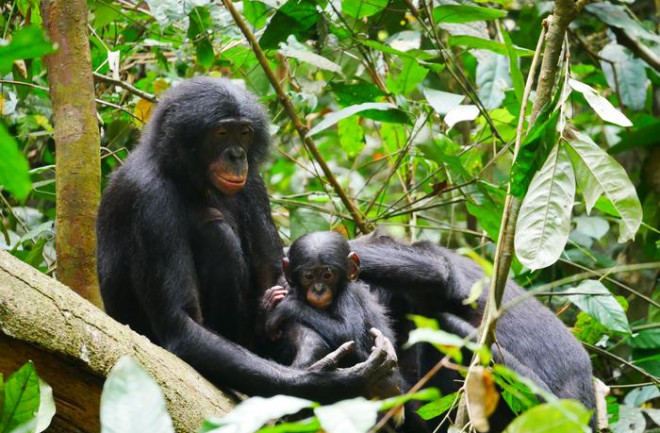Bonobos have a reputation as lovers, not fighters. But the primate species — perhaps infamous for using sex as a conflict resolution tool — exhibits more complex behavior around mating than previously thought.
Male bonobos actually act more aggressively than male chimpanzees, but the way the two species uses violence or the threat of it differs dramatically, according to a new study in Current Biology.
“This study brings more complexity to the simple image of bonobo as the ‘make love not war’ ape,” says Maud Mouginot, a Boston University postdoc who conducted the observations as part of her Ph.D. research.
Bonobo and Chimpanzee Aggression
Mouginot's fieldwork observations revealed that male bonobos exhibited aggressive behavior almost exclusively toward males, while chimpanzees more often reserved their violence for females. And when chimp violence did occur among males, it often involved coalitions.
Hostility between male bonobos was much more likely to be one on one, and male on male. However, unlike chimps, the bonobos didn’t coerce sex from females, nor did they kill any female bonobo or baby bonobo.
Read More: Bonobos Act Like Babies After Fights
Observing Bonobo and Chimp Behavior
Before Mouginot set out to Africa to observe the primates, she expected to see some bonobo aggression. “Bonobos have this reputation to be peaceful, but I always thought that this was too simplistic,” she says.
But the amount of aggression surprised her. She observed 12 bonobos in the Congo’s Kokolopori Bonobo Reserve and two chimpanzee communities in Tanzania’s Gombe National Park. She tracked her subjects all day and recorded their behavior. When she tallied the totals, she initially thought she was wrong. Her data showed that bonobos engaged in 2.8 times more aggressive interactions and 3 times as many physical aggressions.
“I had some expectation that we would observe SOME aggressions by bonobos,” Mouginot says. “But I was surprised to see so many instances.
Because her observations partially contradict a prevailing hypothesis that aggression has been selected against in bonobos and humans but not chimpanzees, she redid her data tables over and over. She also re-examined every aggression incident.
“The reality is that when I found these results, I initially thought I did something wrong,” Mouginot says.
Read More: Why Are Chimpanzees and Gorillas Suddenly Going to War?
Mouginot thinks the social patterns that vary between bonobos and chimps may at least partially explain the differences. First, bonobo society tends to be more matriarchal. Second, they use coalitions differently. A male chimp may be less likely to attack another, because other males might gang up against him.
Bonobos have complex behaviors that depend on a lot of factors including their environment and their social organization.
“Even though they might use copulation as a form of conflict resolution, that does not mean aggression does not exist and does not provide some form of benefits,” says Mouginot.
The bottom line, though, is that both bonobos and chimpanzees use aggression when mating — meaning nice primates finish last.
Read More: What Are the Smartest Primates?
Article Sources
Our writers at Discovermagazine.com use peer-reviewed studies and high-quality sources for our articles, and our editors review for scientific accuracy and editorial standards. Review the sources used below for this article:
Current Biology. Differences in expression of male aggression between wild bonobos and chimpanzees.
Maud Mouginot. Boston University postdoc


Social Structures Could Impact Primate Aggression